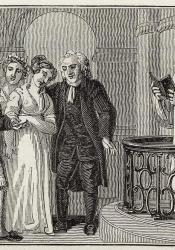Church of England
King Henry VIII was less concerned with doctrine and more concerned with logistics so he could divorce his wife. This was in 1534, almost 300 years before we get to the era of Pride and Prejudice, Percy Shelley, and others in the Romantic era. Its important to understand the history of the Church of England to truly grasp the effect it had during the Romantics period. Between King Henry VIII and the Regency era is about 300 years - 300 years of being separated from the Catholic church and 300 years of being its own religious entity. Considering the Church of England was started on the bases of manipulating doctrine, that can create a lot of disfunction within a religion (or any organization) given that amount of time. For example, the King James version of the Bible was obviously not written by King James, but he had a huge hand in approving its translation (and he was the head of the Church of England).
The Church of England and Parliament were very intertwined for centuries. For example, in order to hold a seat in Parliament in 1815, a man had to belong to the Church of England - that would exclude every other religion and any other type of belief from influencing England’s government.
Most findings about the disonnance that people in England had against the Church of England revolve around its ever-changing doctrine (a lot of Christians wanted something more stable, they wanted the doctrine to make sense and to be reliable), and the disorganization of the church (church money was being unevenly distributed so there were a few very wealthy clergyman and many overworked vicars not receiving adequate funding). There were also a lot of people given the position of clergyman that shouldn’t have been given positions.
Jane Austen would have been heavily influenced by the Church of England in her life, as well as the characters in her novel. Considering Austen had so many marriages take place, it would have been common knowledge at the time that those marriages would have been performed by a clergyman of the Church of England (nothing else was permitted at the time). Percy Shelley is more obvious in his distaste of what is going on with the Church of England from his poems (England 1819 is a perfect example). The Church of England was having a difficult time appeasing the people while having control in Parliament; due to this struggle the Church lost a lot of followers back to Catholicism and other denominations, so much so that by 1851 only about 15% of the population in England was actually still part of the Church of England (so Shelley wasn’t just uptight about what was going on). Furthermore, in 1829 the Catholic Emancipation Act was introduced and witnessed that Parliment would no longer only be acting for the Church of England, but for others as well (which was huge considering it was showing a lessening of the power the Church of England had politically and socially).
Bloy, Marjorie. A Webb of English History. 7 May 2017, http://www.historyhome.co.uk/peel/religion/relandpol.htm
Rattey, Julie. Pride and Principle: The Spiritual Side of Jane Austen’s Novels. America: The Jesuit Review, 23 Sep. 2013, https://www.americamagazine.org/arts-culture/2013/09/10/pride-and-princi...
The Law of Marriage. UK Parliament, 2021, https://www.parliament.uk/about/living-heritage/transformingsociety/priv...
Religion in the Nineteenth Century. UK Parliament, 2021, https://www.parliament.uk/about/living-heritage/transformingsociety/priv...
Cody, David. The Church of England (the Anglican Church). Hartwick College, 9 April 2021, https://victorianweb.org/religion/denom1.html

